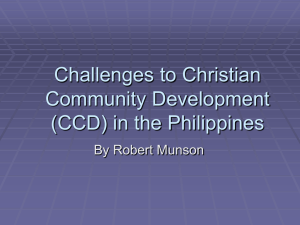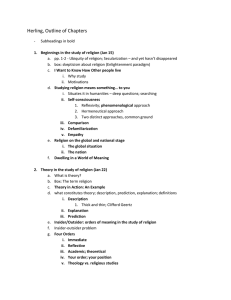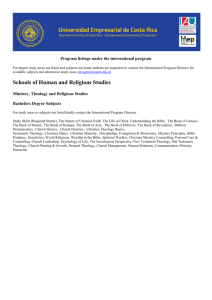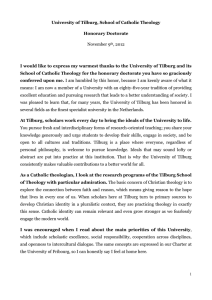Laudatio of Prof. Guido Vergauwen by Prof. Adelbert Denaux (Dies... Professor Guido Vergauwen
advertisement
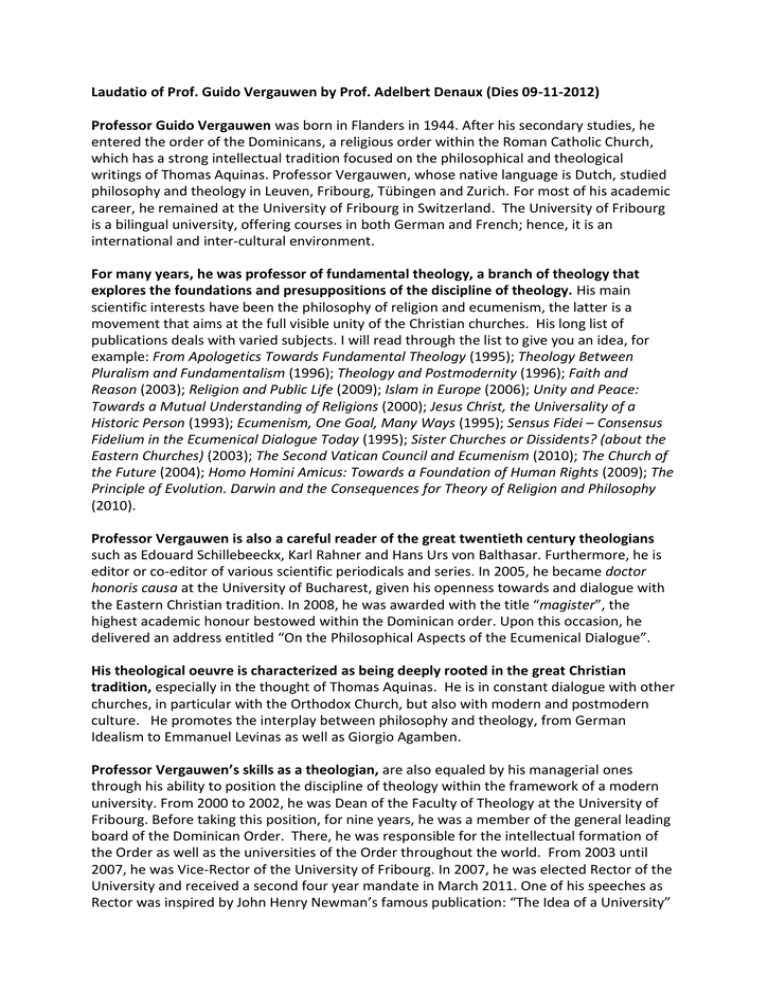
Laudatio of Prof. Guido Vergauwen by Prof. Adelbert Denaux (Dies 09-11-2012) Professor Guido Vergauwen was born in Flanders in 1944. After his secondary studies, he entered the order of the Dominicans, a religious order within the Roman Catholic Church, which has a strong intellectual tradition focused on the philosophical and theological writings of Thomas Aquinas. Professor Vergauwen, whose native language is Dutch, studied philosophy and theology in Leuven, Fribourg, Tübingen and Zurich. For most of his academic career, he remained at the University of Fribourg in Switzerland. The University of Fribourg is a bilingual university, offering courses in both German and French; hence, it is an international and inter-cultural environment. For many years, he was professor of fundamental theology, a branch of theology that explores the foundations and presuppositions of the discipline of theology. His main scientific interests have been the philosophy of religion and ecumenism, the latter is a movement that aims at the full visible unity of the Christian churches. His long list of publications deals with varied subjects. I will read through the list to give you an idea, for example: From Apologetics Towards Fundamental Theology (1995); Theology Between Pluralism and Fundamentalism (1996); Theology and Postmodernity (1996); Faith and Reason (2003); Religion and Public Life (2009); Islam in Europe (2006); Unity and Peace: Towards a Mutual Understanding of Religions (2000); Jesus Christ, the Universality of a Historic Person (1993); Ecumenism, One Goal, Many Ways (1995); Sensus Fidei – Consensus Fidelium in the Ecumenical Dialogue Today (1995); Sister Churches or Dissidents? (about the Eastern Churches) (2003); The Second Vatican Council and Ecumenism (2010); The Church of the Future (2004); Homo Homini Amicus: Towards a Foundation of Human Rights (2009); The Principle of Evolution. Darwin and the Consequences for Theory of Religion and Philosophy (2010). Professor Vergauwen is also a careful reader of the great twentieth century theologians such as Edouard Schillebeeckx, Karl Rahner and Hans Urs von Balthasar. Furthermore, he is editor or co-editor of various scientific periodicals and series. In 2005, he became doctor honoris causa at the University of Bucharest, given his openness towards and dialogue with the Eastern Christian tradition. In 2008, he was awarded with the title “magister”, the highest academic honour bestowed within the Dominican order. Upon this occasion, he delivered an address entitled “On the Philosophical Aspects of the Ecumenical Dialogue”. His theological oeuvre is characterized as being deeply rooted in the great Christian tradition, especially in the thought of Thomas Aquinas. He is in constant dialogue with other churches, in particular with the Orthodox Church, but also with modern and postmodern culture. He promotes the interplay between philosophy and theology, from German Idealism to Emmanuel Levinas as well as Giorgio Agamben. Professor Vergauwen’s skills as a theologian, are also equaled by his managerial ones through his ability to position the discipline of theology within the framework of a modern university. From 2000 to 2002, he was Dean of the Faculty of Theology at the University of Fribourg. Before taking this position, for nine years, he was a member of the general leading board of the Dominican Order. There, he was responsible for the intellectual formation of the Order as well as the universities of the Order throughout the world. From 2003 until 2007, he was Vice-Rector of the University of Fribourg. In 2007, he was elected Rector of the University and received a second four year mandate in March 2011. One of his speeches as Rector was inspired by John Henry Newman’s famous publication: “The Idea of a University” and was entitled: “‘Fitness for the World’: Reflections on the Vocation of a University”. It shows his lively interest in the role that universities have to play in society, a theme that is highlighted in our Dies today. Because of the special merits of his entire corpus, which focuses on the relationship between faith and reason, between Christianity and culture, on ecumenical issues, in particular the relationship with the Orthodox churches and on intercultural and interreligious dialogue, Professor Vergauwen deserves recognition. But also because of the excellent manner in which he has performed his role as Dean, Vice-Rector and Rector of the University of Fribourg, by contributing to the excellent quality of education and research at a secular institution, through the inspiration of the wisdom of the Christian tradition, it is my great pleasure, on behalf of our Rector, to grant Professor Guido Vergauwen a Doctorate honoris causa of Tilburg University.


